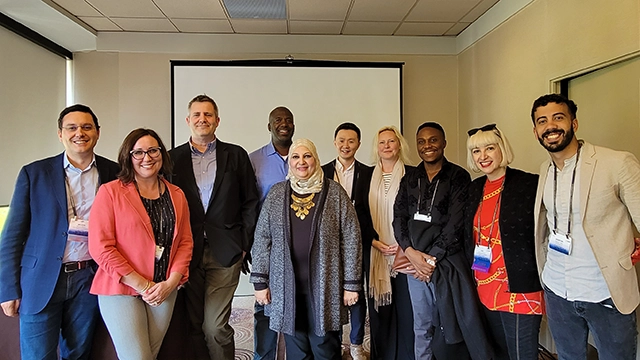
By Nizole Qete
Lecturer in Rhodes University's School of Journalism & Media Studies, Dr Chikezie Uzuegbunam, has been selected among other international research scientists to join the IPIE, the International Panel on the Information Environment.
Dr Uzuegbunam said, "I was inspired to get on board when I received a special invitation. A scholar who knows my work put my name forward to the IPIE Secretariat, and they contacted me. I accepted the invitation because of the initiative's alignment with my current research interests in mis/disinformation in Africa and the impact of emerging technologies on our world."
The IPIE was officially launched on 24 May 2023 in Washington, DC. It is an independent global science organisation committed to providing actionable scientific knowledge about threats to the world's information environment. IPIE aims to advance high-quality, policy-relevant research on algorithmic bias, manipulation, and misinformation for policymakers globally. The IPIE will provide a forum for researchers to share their findings and work with policymakers to develop evidence-based solutions to the information environment's challenges.
Dr Uzuegbunam will be providing his contributions and expertise in two countries, South Africa and Nigeria. "I am of Nigerian origin and a permanent resident of, and working in, South Africa. I consider myself an ambassador for both countries, which are very dear to me. I will be working to provide research, policy advice, and support to the IPIE in both countries because of my years of experience working in these two contexts and my familiarity with both landscapes. African countries need to be a strong part of the global conversation on the impact of the information environment. IPIE affiliates like myself will ensure our voices are not silent within these global conversations on mitigating and ending information disorders. We will provide neutral assessments of the condition of the global information environment in our locations and evaluate the best policy solutions for addressing threats to that environment," said Dr Uzuegbunam.
He further stated that he had already contributed to the IPIE before its official launch in May. "I have been advising on and supporting a media and publicity strategy for the IPIE in South Africa and Nigeria. This includes suggesting critical informational issues facing African countries and suggesting networks to work with and collaborate with. In the future, I will contribute to the IPIE's three core panels: Ethics, Methodology, and Membership, to drive the research and policy conversations forward. Africa-based affiliates like myself will work with the organisation to bring key partners to the continent, host events here, and initiate collaborations with the government and the public. The overarching goal is this: to commit ourselves to building a healthier information environment locally, regionally, and worldwide."
Dr Uzuegbunam was recently in Toronto, Ontario, Canada, attending the International Communication Association (ICA) global conference. He chaired a session on "Mobility as Central for Mobile Communication" on 26 May and presented his research on mobile devices and health on 28 May. The title of his presentation was "Young People's Health Imaginaries in Everyday Life: Using Digital and Social Media for Health Information-Seeking", which is based on his recent research.
Following the IPIE's launch at the Nobel Prize Summit on 24 May, a meeting of the affiliates and the Chair of IPIE, Professor Phil Howard, was held at the ICA conference.
Dr Uzuegbunam also expressed his gratitude to Rhodes University for travel support.

